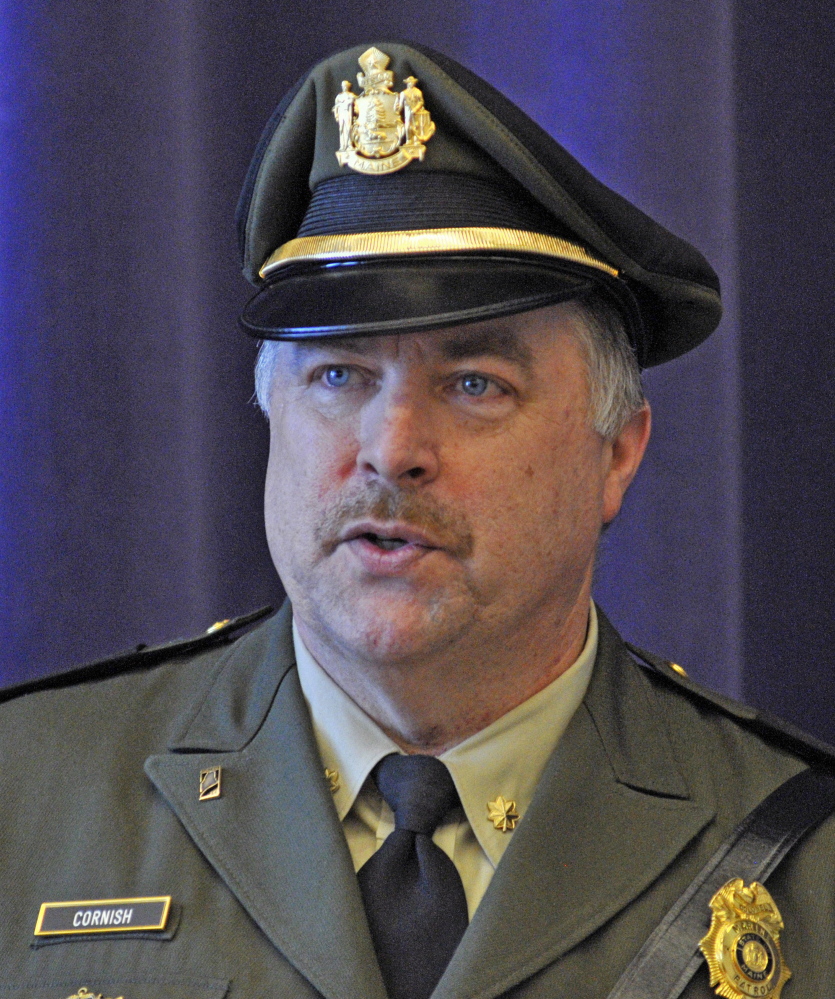VASSALBORO — The agency involved with enforcing Maine’s fishing laws has a new chief.
Jon Cornish, a 29-year veteran, was promoted Friday to colonel overseeing the Maine Marine Patrol.
“I pledge to do my best to preserve the public trust,” Cornish told friends, family and industry representatives who gathered at the Maine Criminal Justice Academy for the promotion and change of command ceremony.
Cornish takes the place retiring Col. Joe Fessenden, who was with the agency for 40 years, half of which as chief of the Department of Marine Resources’ law enforcement wing. Fessenden, who conducted the background check on Cornish before he was hired 30 years ago, said the Marine Patrol is being left in capable hands.
“I feel real good about his coming in,” Fessenden said. “He’s ready to hit the ground running.”
With only about 50 officers, the Marine Patrol is the state’s smallest law enforcement agency. Fessenden said budgetary constraints have prevented adding officers, so the department has come to rely heavily on partners such as the U.S. Coast Guard, National Marine Fisheries Service and local agencies, such as the Maine Warden Service and community police.
“The thing I’m most proud of is our relationship with the fishermen,” Fessenden said, recognizing a group of commercial fishermen who attended the ceremony.
Patrick Keliher, commissioner of the Maine Department of Marine Resources, said Fessenden’s ability to build relationships with fishermen and other agencies, and the standards he set for his officers, will serve the agency well for years to come.
“It was that work that was the cornerstone of Colonel Fessenden’s legacy,” Keliher said.
The commissioner said Cornish, who was able to work alongside Fessenden to learn the ropes during the past 18 months that he served as deputy chief, is the right person to build upon that legacy.
“Major Cornish brings a perfect combination of wisdom and experience to his new post,” Keliher said.
Cornish was promoted to major in the summer of 2013, shortly after the retirement last summer of Maj. Alan Talbot, who served with the agency for 25 years. As the major, Cornish was responsible for overseeing the officers in the field, including planning, coordinating, assigning and overseeing Marine Patrol enforcement activities. Cornish has worked closely with Fessenden throughout his term as deputy chief, Fessenden said.
“He’s been able to participate and observe what’s happening,” Fessenden said.
The decision of choosing the new colonel ultimately belonged to Keliher, but Fessenden agreed with the selection.
“Jon was my pick for the job,” he said.
Cornish, 51, was hired as a Marine Patrol Officer in 1985. His first post was in Bucksport. He spent a number of years taking assignments down the coast, working his way closer to his hometown of Topsham.
“There was an effort all the time to get closer to home,” he said.
He finally landed a patrol around Bailey Island in Harpswell, just a few miles from his hometown of Topsham and alma mater, Mount Ararat High School.
“It was kind of in my back yard,” Cornish said.
In 2001, Cornish was promoted to sergeant overseeing six officers and a boat specialist. He continued to work in the field.
“I was in the field a long time,” he said. “Just shy of 16 years.”
Three years later, in 2004, Cornish was promoted to lieutenant, overseeing three sergeants and 18 officers in the western half of the state.
Cornish gained a reputation for developing standards to help resolve conflicts between fishermen.
“Jon has been top notch as a Marine Patrol official,” Saco ground fisherman Vincent Balzano said at the time of Cornish’s promotion to major. “His effort to resolve gear conflicts is a classic example of how he helps different constituents reach an understanding.”
Cornish said it will take all of his skill and experience to replace Fessenden.
“Everyone knows him and trusts him,” Cornish said. “”It’s a tremendous challenge. I feel I’m up for it.”
Cornish said he shares Fessenden’s respect for those in the fishing industry.
“I think he and I have a lot of the same concerns and passions,” Cornish said.
He said spending more than two decades in the field and learning the job from the ground up will help him be a more effective commander.
“The more field time an officer gets before being promoted, I think, is a positive,” Cornish said. “It allows you to relate to the officers.”
Cornish said his mission is to maintain and build upon the relationships that have been built within the industry and to create more educational and training opportunities for the officers. Cornish said he wants to build on Fessenden’s effort to recruit and retain officers. He said the department had nine openings last year. It currently has one.
“We’ve had some people leave we wish hadn’t left,” Cornish said. “We really want to work on that.”
Keliher has gone to great lengths to listen to the fishermen and Marine Patrol Officers in the state. The effort has not escaped Cornish’s notice. It is a big part of the reason Cornish decided to continue working after nearly 30 years of service.
“We have a commissioner in place now that really cares as much as we do,” Cornish said. “If it weren’t for that commitment I would have retired.”
Keliher said it is difficult as the chief to maintain rapport with the officers, but he looks forward to looking out for their interests and giving them what they need to do their jobs.
“The face of this bureau are the officers out in the field,” Cornish said. “How they interact with the fishermen is, at the end of the day, how they see our agency.”
Send questions/comments to the editors.



